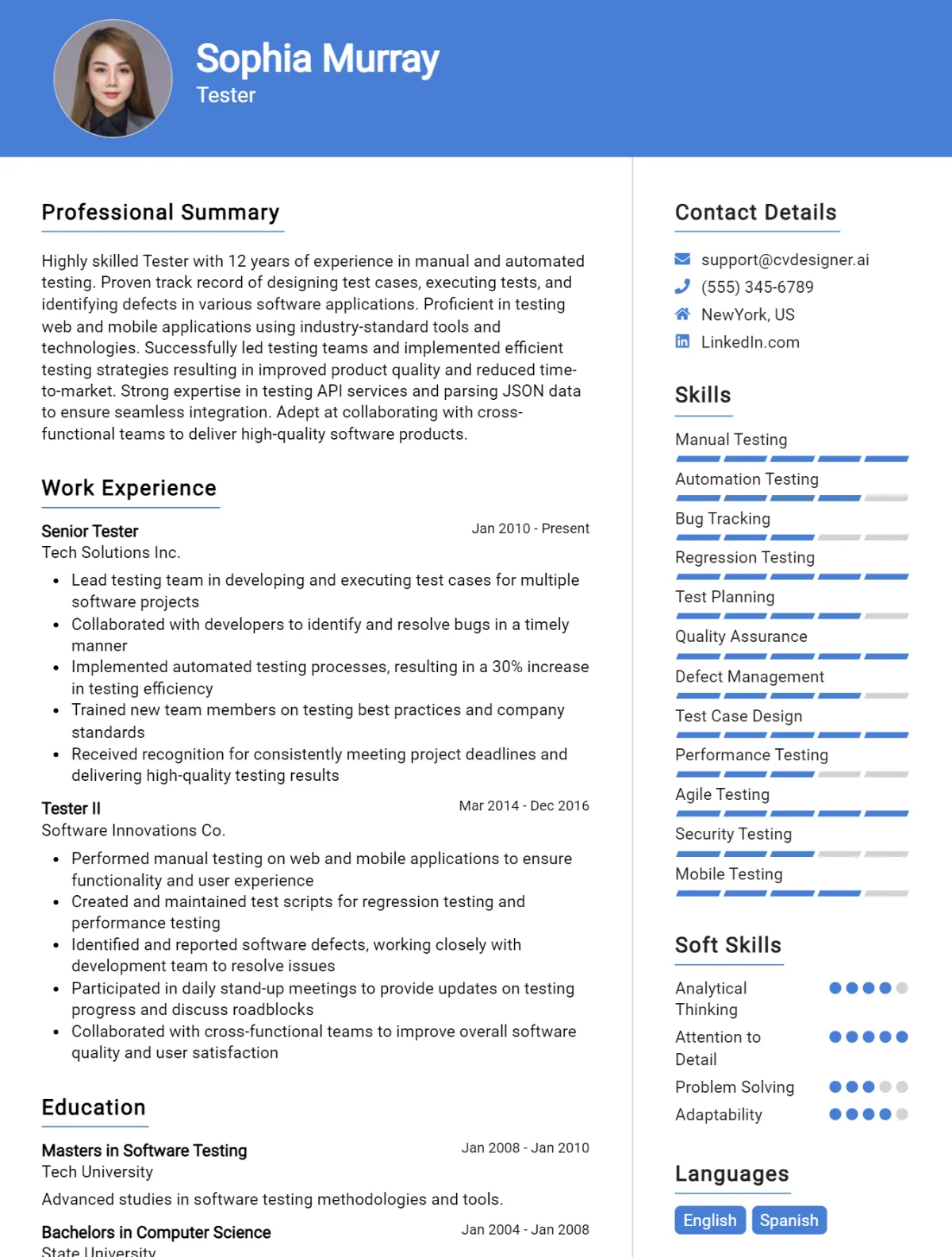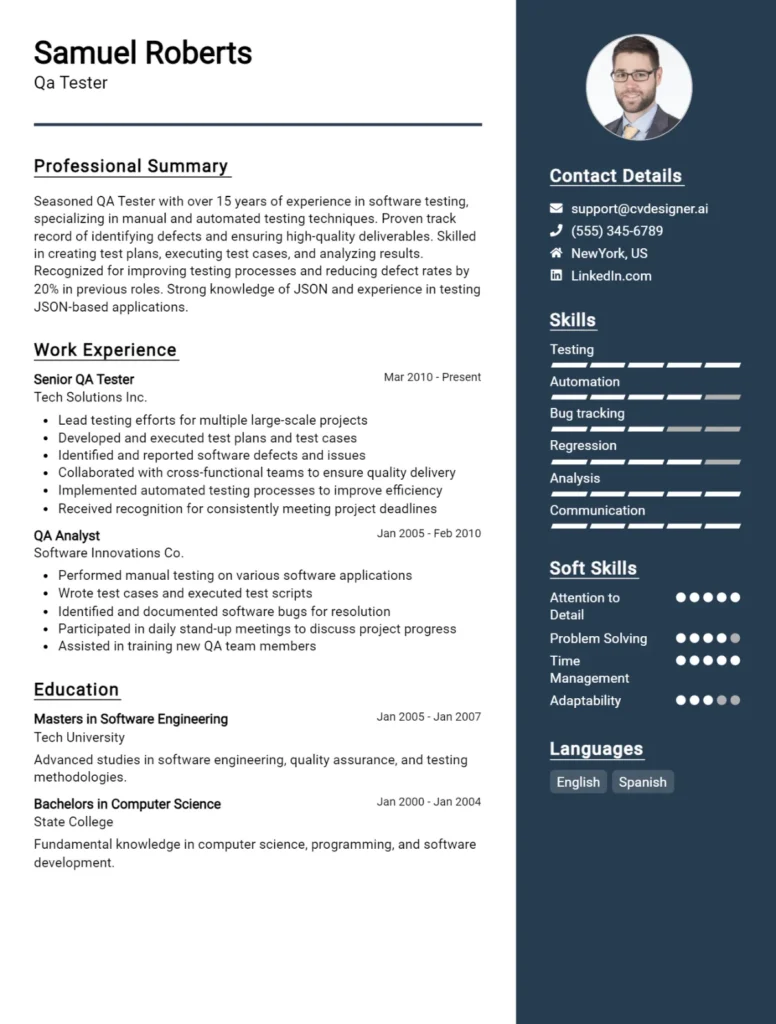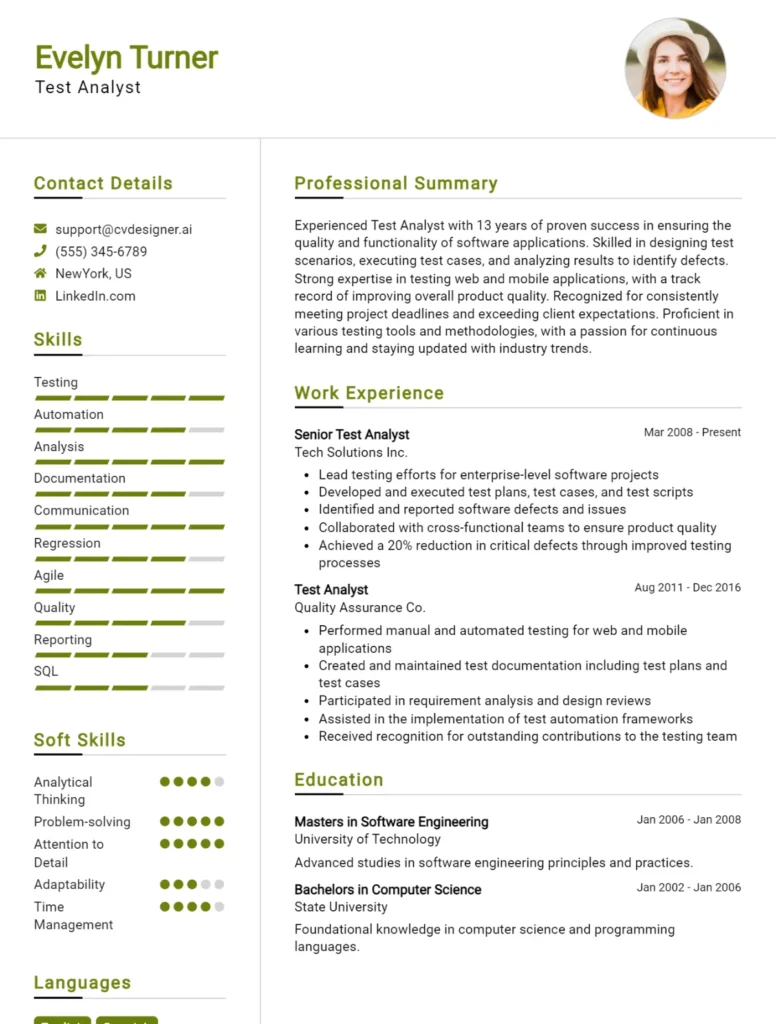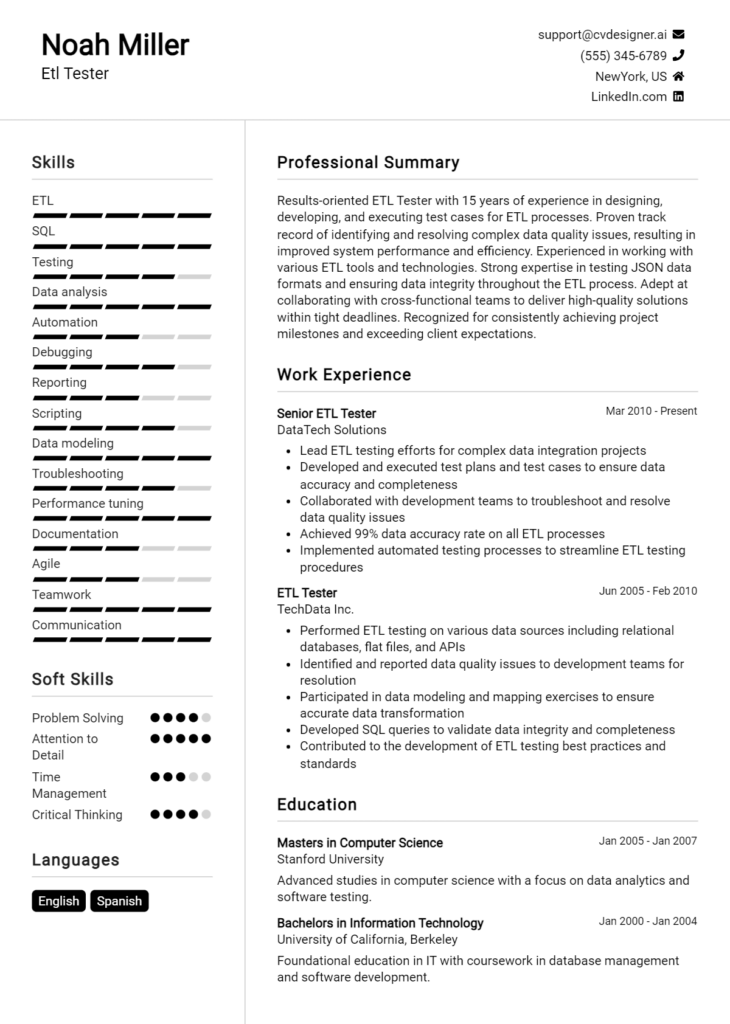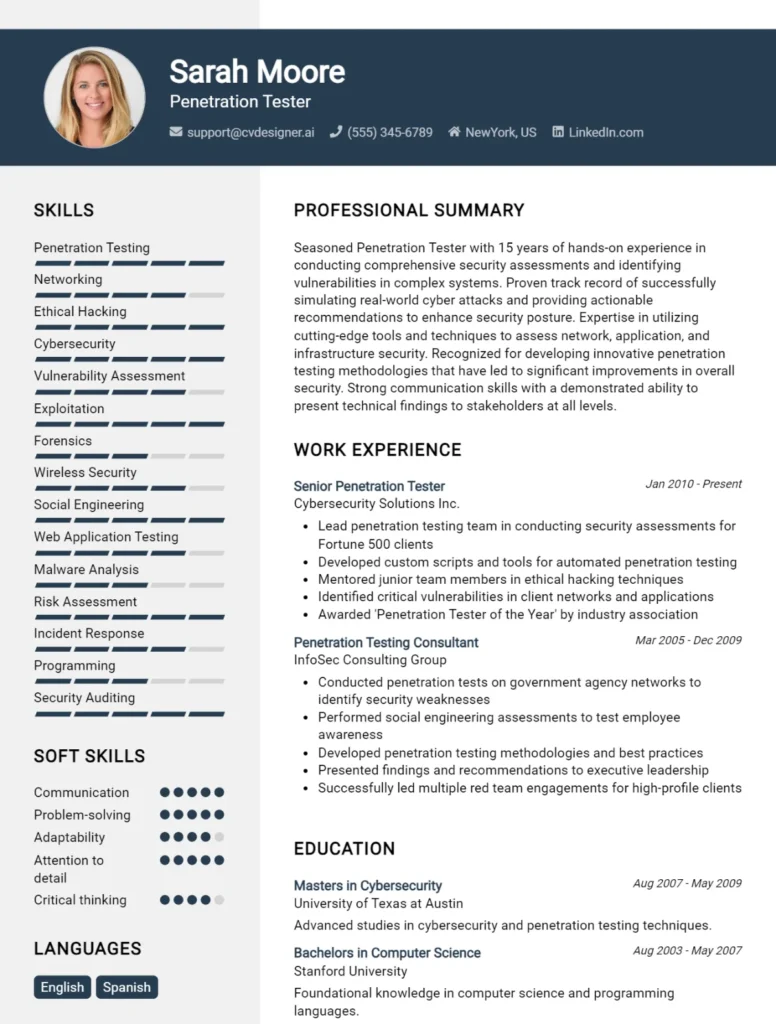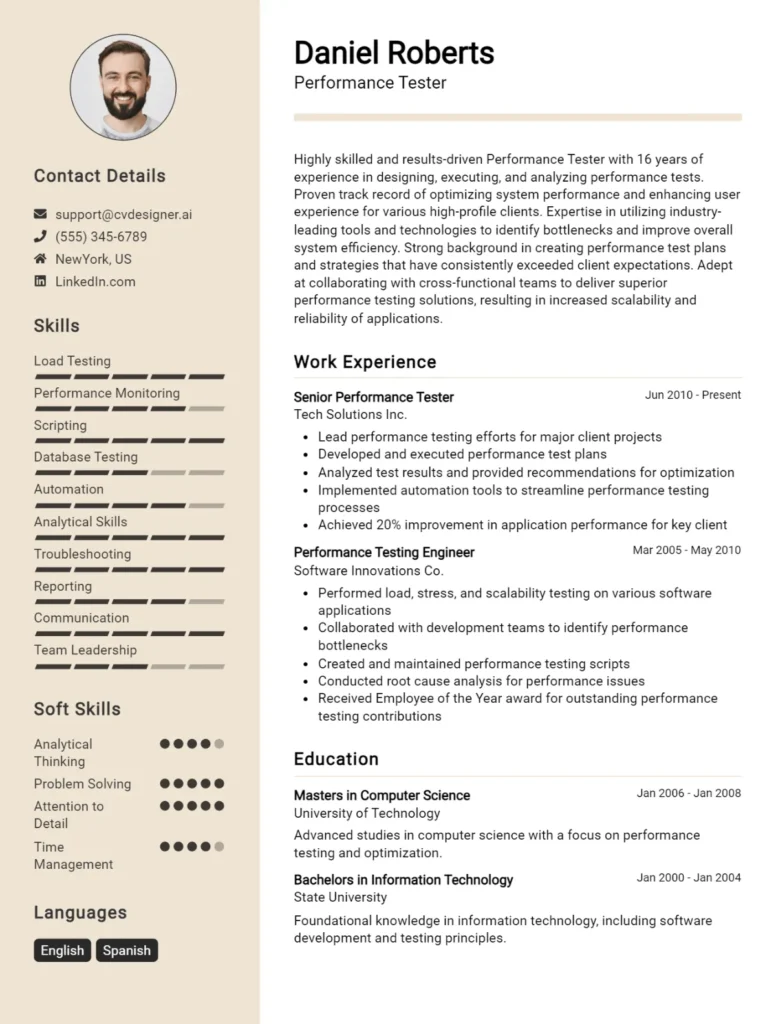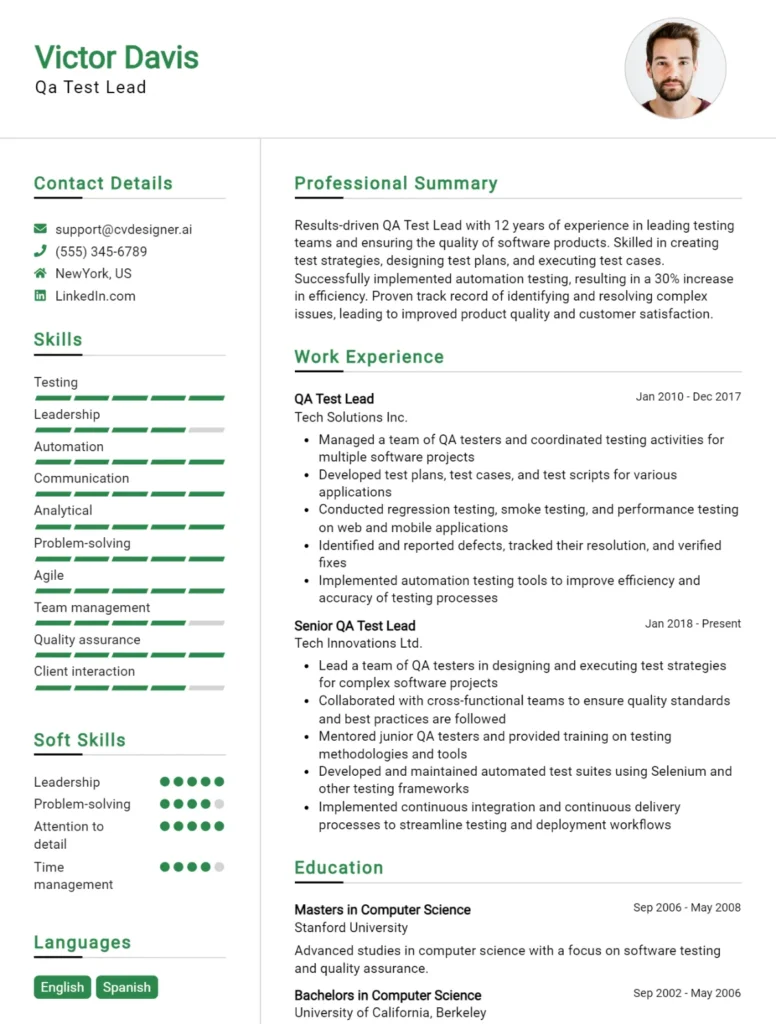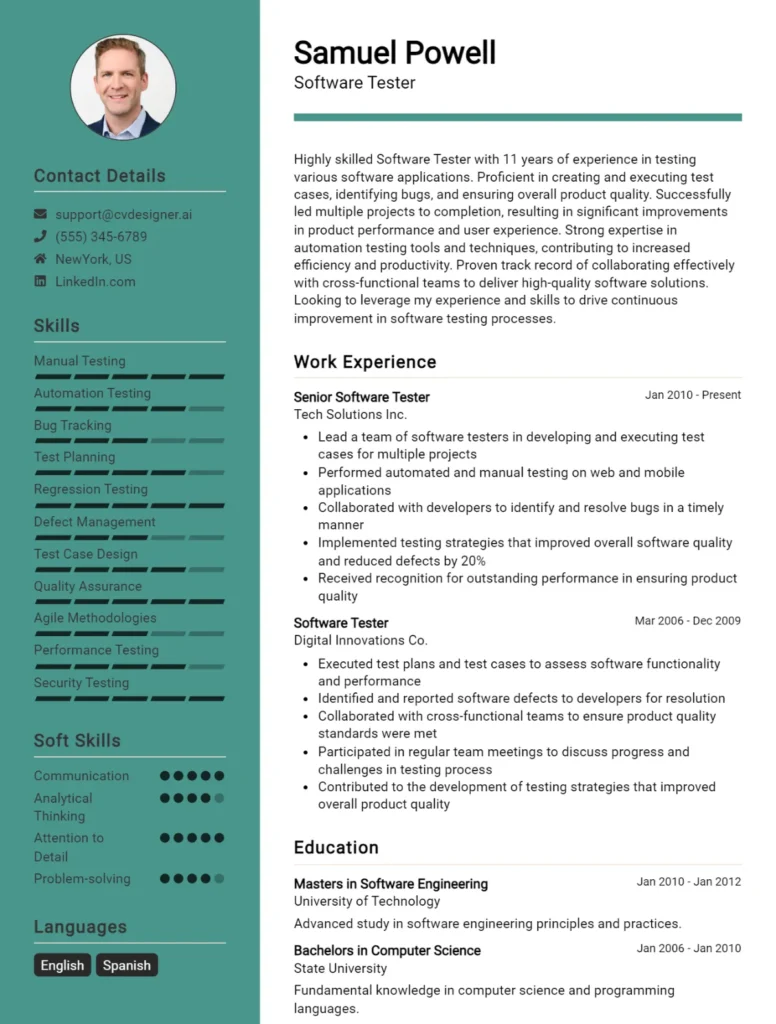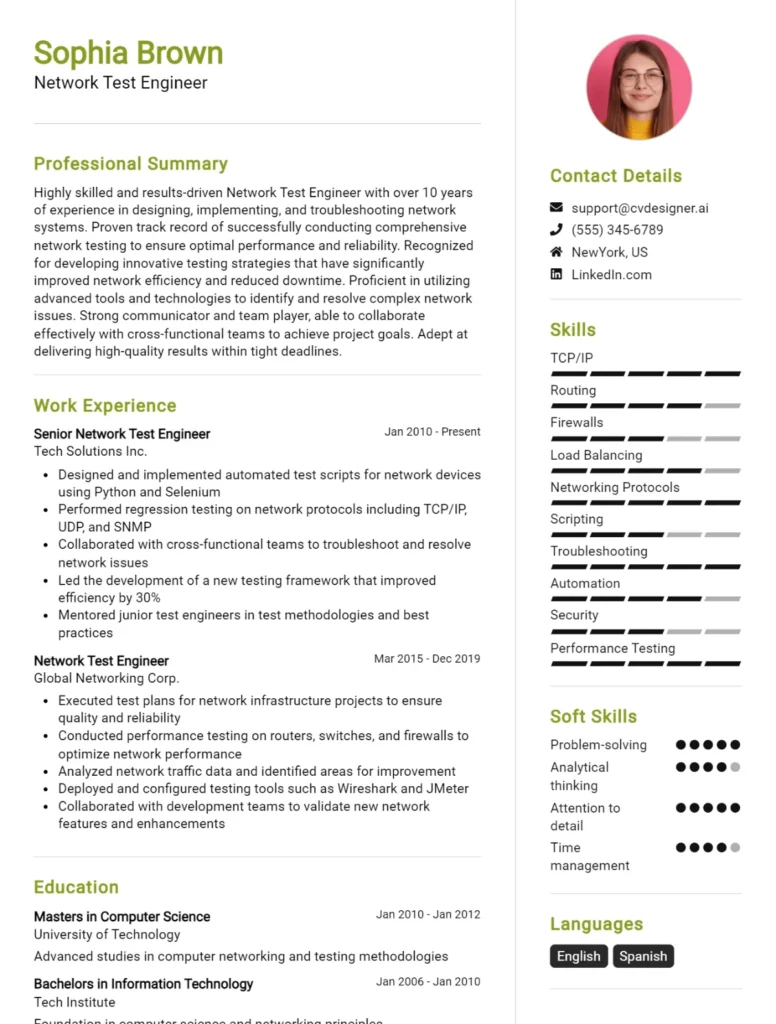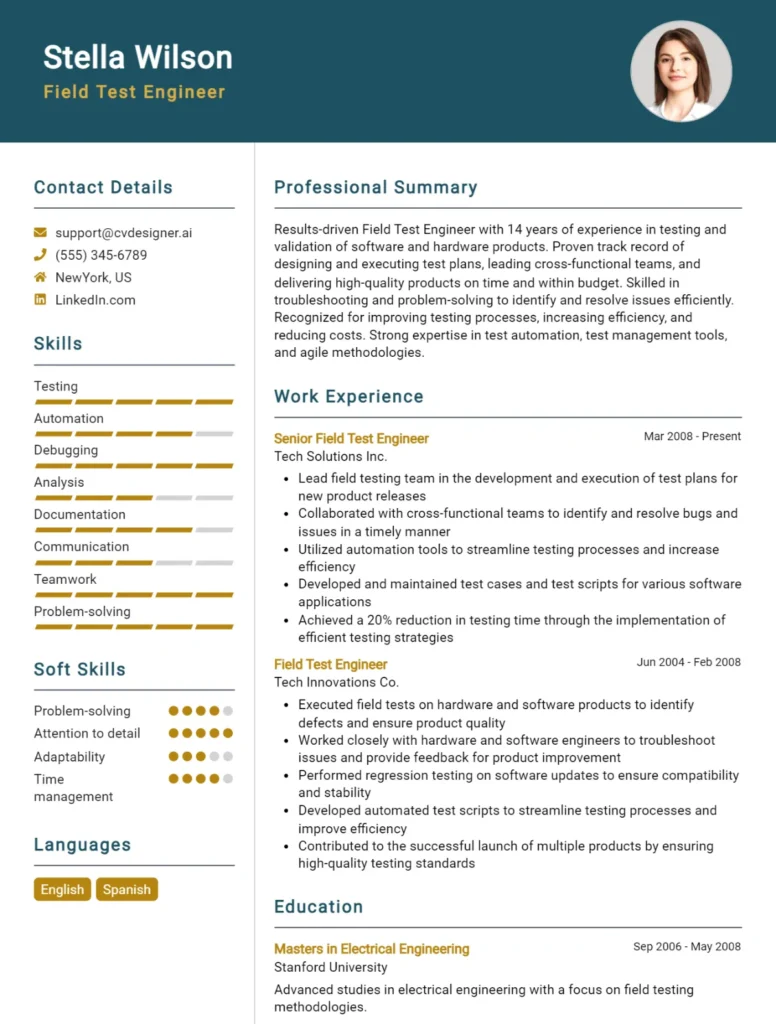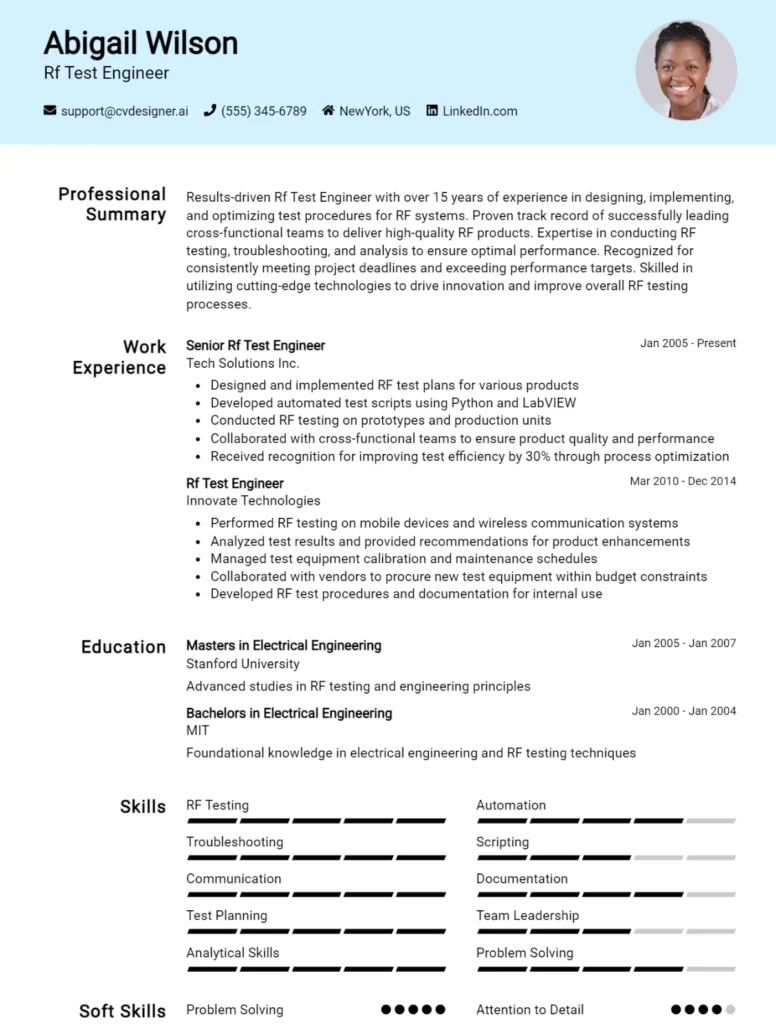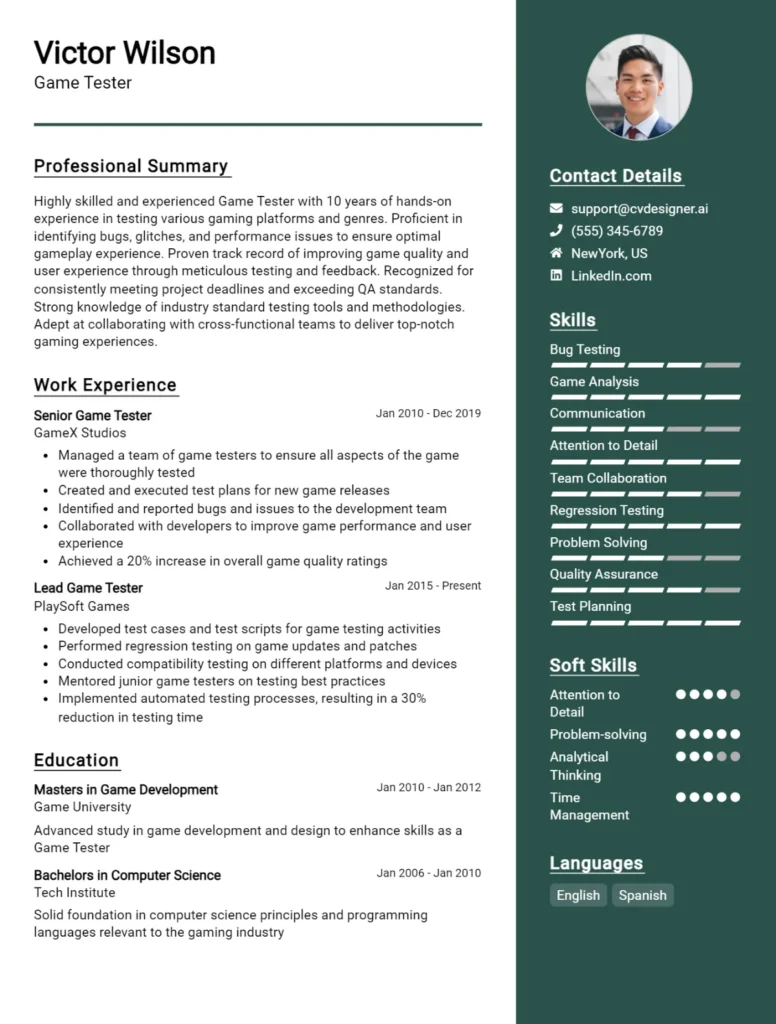Most Popular Tester CV Examples
Explore additional Tester CV samples and guides and see what works for your level of experience or role.
As a Tester, your role is crucial in ensuring the quality and functionality of software products before they reach the end-users. Crafting an effective CV is your first step toward landing that perfect job in this competitive field. In this comprehensive guide, we will explore essential tips and strategies for creating a standout Tester CV that highlights your skills, experience, and achievements. You’ll find an illustrative CV example that serves as inspiration, along with actionable advice on how to tailor your CV to catch the attention of hiring managers. Key points covered include:
- Understanding the fundamental structure of a Tester CV
- Highlighting relevant technical skills and certifications
- Showcasing your experience with various testing methodologies
- Incorporating metrics to demonstrate your impact on projects
- Tailoring your CV for specific job applications
- Tips for writing a compelling personal statement
- Common pitfalls to avoid when drafting your CV
Get ready to transform your CV into a powerful tool that showcases your expertise and paves the way for your next career opportunity!
What is a Tester CV?
A Tester CV serves as a crucial document that highlights a candidate's technical skills, experience, and qualifications in software testing. It typically outlines relevant work history, educational background, and key competencies such as familiarity with testing tools, programming languages, and methodologies. A well-crafted CV not only showcases a Tester's ability to identify bugs and ensure product quality but also emphasizes their problem-solving skills and attention to detail. For guidance on creating an effective CV, you can refer to this comprehensive cv writing guide.
The importance of a Tester CV lies in its role as a marketing tool that presents the candidate to potential employers. It helps differentiate one applicant from another in a competitive job market by effectively communicating their unique skills and experiences. A polished CV can significantly increase the chances of securing an interview, allowing the Tester to further demonstrate their capabilities. Utilizing a cv maker can streamline the process, ensuring that the CV is not only visually appealing but also tailored to the specific requirements of the testing role.
Key Components of a Tester CV
- Contact Information: Include your full name, phone number, email address, and LinkedIn profile to ensure potential employers can easily reach you.
- Professional Summary: A brief overview of your career, highlighting your experience as a tester, key skills, and what you can bring to a potential employer.
- Key Skills: List relevant skills, such as manual testing, automated testing, performance testing, and familiarity with testing tools. For a comprehensive guide on skills, refer to skills.
- Work Experience: Outline your previous roles, emphasizing your responsibilities and achievements in testing. Highlight specific projects and methodologies you’ve used. For more details, check work experience.
- Education: Include your educational background, such as degrees obtained, institutions attended, and any relevant certifications in software testing or quality assurance.
- Certifications: List any professional certifications you have earned, such as ISTQB or CSTE, which demonstrate your knowledge and commitment to the field.
- Technical Proficiencies: Mention any programming languages, testing frameworks, and tools you are proficient in, such as Selenium, JIRA, or LoadRunner.
- Projects: Highlight specific testing projects you have worked on, detailing your role and the impact of your contributions on the project's success.
- Soft Skills: Emphasize interpersonal skills such as communication, teamwork, and problem-solving, which are crucial for effective collaboration in testing environments.
- Professional Affiliations: Include memberships in professional organizations related to software testing, as this shows your dedication to staying informed about industry standards.
- References: Provide references or indicate that they are available upon request, ensuring potential employers can verify your qualifications and work ethic.
- Additional Information: Mention any relevant volunteer work, workshops, or conferences attended that relate to testing, showcasing your continued learning and engagement in the field.
Sample Tester CV for Inspiration
John Doe
123 Tester Lane
Cityville, ST 12345
(123) 456-7890
johndoe@email.com
LinkedIn: linkedin.com/in/johndoe
Professional Summary
Detail-oriented and analytical Tester with over 5 years of experience in software testing and quality assurance. Proficient in manual and automated testing methodologies, with a strong focus on delivering high-quality products. Proven ability to identify issues and drive improvements through rigorous testing processes. Excellent communication skills, adept at collaborating with cross-functional teams to ensure successful project outcomes.
Work Experience
Software Tester
ABC Technologies, Cityville, ST
June 2020 - Present
- Conduct comprehensive testing of web and mobile applications, ensuring functionality, usability, and performance meet specified requirements.
- Develop and execute test plans, test cases, and test scripts for both manual and automated testing.
- Collaborate closely with developers and product managers to identify, document, and resolve defects in a timely manner.
- Perform regression testing and maintain test documentation, resulting in a 30% reduction in post-release defects.
- Utilize tools such as Selenium, JIRA, and TestRail to improve testing efficiency and tracking.
Junior Tester
XYZ Solutions, Cityville, ST
January 2018 - May 2020
- Assisted in the development of test strategies and test case design for various software applications.
- Participated in daily stand-up meetings, contributing to the Agile development process and ensuring alignment with team goals.
- Executed functional, integration, and user acceptance testing, providing detailed feedback to the development team.
- Trained and mentored new testers on testing best practices and tools, fostering a collaborative team environment.
- Documented and tracked defects, ensuring timely resolution and thorough verification of fixes.
Education
Bachelor of Science in Computer Science
Cityville University, Cityville, ST
Graduated: May 2017
Skills
- Manual Testing
- Automated Testing (Selenium, JUnit)
- Test Case Design
- Defect Tracking (JIRA, Bugzilla)
- Test Management (TestRail, Quality Center)
- Performance Testing (JMeter, LoadRunner)
- Agile Methodologies (Scrum, Kanban)
- Strong Analytical Skills
- Excellent Communication and Team Collaboration
Publications
- "Best Practices for Software Testing: Ensuring Quality in Agile Development," Tech Journal, March 2023.
- "The Importance of Regression Testing in Software Development," Quality Assurance Monthly, August 2022.
Certifications
- Certified Software Tester (CST) – International Software Testing Qualifications Board, 2021
- ISTQB Certified Tester Foundation Level (CTFL) – ISTQB, 2020
- Selenium WebDriver with Java - Basics to Advanced (Udemy), 2022
References available upon request.
Tester CV Writing Tips
When crafting a CV for a Tester role, it is essential to focus on showcasing your technical skills, attention to detail, and problem-solving abilities. Start by tailoring your CV to the specific job by including relevant keywords and phrases from the job description. Highlight your experience with various testing methodologies, tools, and frameworks, as well as any certifications that demonstrate your expertise. Make sure to quantify your achievements where possible, as this adds credibility to your skills and shows potential employers the impact you've made in previous roles. Lastly, ensure your CV is well-organized, free of errors, and easy to read, as this reflects your attention to detail, a crucial trait for any Tester.
- Use a clear and concise format: Choose a clean layout with distinct sections to make your CV easy to navigate.
- Tailor your CV for each application: Customize your CV to align with the specific requirements of the Tester position you’re applying for.
- Highlight relevant skills: Focus on technical skills such as automation tools (e.g., Selenium, JUnit) and methodologies (e.g., Agile, Scrum).
- Detail your experience: Include specific examples of projects you’ve worked on, emphasizing your role and the testing techniques used.
- Showcase certifications: Mention any relevant certifications, such as ISTQB or CSTE, to demonstrate your qualifications.
- Quantify your accomplishments: Use metrics and data to illustrate your impact, like reduced bug counts or improved testing efficiency.
- Include soft skills: Highlight attributes such as teamwork, communication, and analytical thinking, which are valuable in a Tester role.
- Proofread thoroughly: Ensure your CV is free of spelling and grammatical errors, as attention to detail is crucial in testing roles.
Tester CV Summary Examples
As a Tester, showcasing your skills and experience in your CV summary is crucial to capture the attention of potential employers. Here are some effective examples of CV summaries tailored for a Tester role:
- Detail-oriented Software Tester with over 5 years of experience in manual and automated testing environments. Proven track record in identifying bugs and ensuring high-quality software delivery. Strong knowledge of testing methodologies and tools, with a passion for improving processes and enhancing user experience.
- Dedicated QA Tester with a strong foundation in both functional and non-functional testing. Experienced in developing test plans, executing test cases, and collaborating with cross-functional teams to deliver robust software solutions. Committed to continuous learning and adapting to new technologies to enhance testing strategies.
- Results-driven Tester with expertise in automation testing using tools like Selenium and JUnit. Adept at analyzing user requirements and translating them into comprehensive test strategies. Excellent problem-solving skills and a keen eye for detail, ensuring the highest level of quality in software products.
- Proficient Software Tester with over 4 years of experience in agile development environments. Skilled in both manual and automated testing, with a focus on performance and security testing. Strong communicator with the ability to work collaboratively with developers and stakeholders to achieve project goals.
- Enthusiastic Tester with a background in both web and mobile application testing. Experienced in various testing frameworks and methodologies, ensuring thorough testing coverage. Passionate about quality assurance and committed to delivering user-friendly and reliable software products.
Build a Strong Experience Section for Your Tester CV
As a Tester, your experience section is a critical component of your CV, showcasing your skills in quality assurance, problem-solving, and attention to detail. Here are some strong examples of work experience descriptions that highlight your contributions and achievements in the field of software testing:
- Developed and executed comprehensive test plans and test cases for web and mobile applications, ensuring a seamless user experience and compliance with project specifications.
- Collaborated with cross-functional teams, including developers and product managers, to identify and resolve software defects, resulting in a 30% reduction in post-release issues.
- Utilized automated testing tools such as Selenium and JUnit to enhance testing efficiency, increasing test coverage by 40% and significantly decreasing manual testing time.
- Conducted performance and load testing using JMeter to assess application stability under high user demand, leading to optimized resource allocation and improved application performance.
- Implemented a continuous integration (CI) testing framework that integrated with Jenkins, enabling faster feedback loops and reducing overall testing time by 25%.
- Participated in Agile ceremonies, including sprint planning and retrospectives, to ensure alignment on testing objectives and contribute to overall project success.
- Conducted user acceptance testing (UAT) with end-users, gathering feedback and ensuring that the final product met user expectations and business requirements.
- Documented and tracked test results, defects, and issues using tools such as JIRA, providing clear communication to stakeholders and facilitating timely resolution of identified problems.
Tester CV Education Examples
A solid educational background can significantly enhance a Tester’s ability to excel in their role by providing them with the necessary skills and knowledge. Below are several examples of educational qualifications that are particularly relevant for individuals pursuing a career in software testing.
- Bachelor’s Degree in Computer Science: This degree provides a strong foundation in programming, algorithms, and software development principles, which are crucial for understanding the technical aspects of testing.
- Bachelor’s Degree in Information Technology: Focusing on the application of technology in business settings, this program equips students with knowledge about software systems, networking, and IT project management, all of which are beneficial in a testing environment.
- Diploma in Software Testing: A specialized diploma program that covers various testing methodologies, tools, and techniques, allowing aspiring Testers to gain hands-on experience and practical knowledge directly applicable to their role.
- Certification in Quality Assurance (QA): Certifications such as ISTQB (International Software Testing Qualifications Board) validate a Tester’s knowledge and skills in quality assurance processes, enhancing their credibility in the field.
- Master’s Degree in Software Engineering: This advanced degree delves deeper into software development and project management, preparing Testers for more complex roles that may involve leading testing efforts or managing teams.
Skills to Highlight in Your Tester CV
As a Tester, your role is crucial in ensuring the quality and reliability of software products. Highlighting a combination of soft and hard skills in your CV will showcase your aptitude for the position and your ability to work effectively within a team. Below is a comprehensive list of essential skills that can strengthen your application and demonstrate your proficiency in software testing.
Soft Skills:
- Attention to Detail
- Analytical Thinking
- Problem-Solving Ability
- Effective Communication
- Team Collaboration
- Adaptability
- Time Management
- Critical Thinking
- Customer Focus
- Conflict Resolution
Hard Skills:
- Proficiency in Testing Tools (e.g., Selenium, JUnit)
- Knowledge of Testing Methodologies (e.g., Agile, Waterfall)
- Understanding of Software Development Life Cycle (SDLC)
- Experience with Automated Testing
- Familiarity with Bug Tracking Tools (e.g., JIRA, Bugzilla)
- SQL and Database Testing Skills
- Scripting Languages (e.g., Python, JavaScript)
- Performance Testing Techniques
- API Testing Knowledge
- Version Control Systems (e.g., Git)
Tester CV Format
When crafting a CV for a Tester role, it’s crucial to tailor your document to reflect your experience and the specific demands of the position. The format you choose should highlight your skills and achievements effectively, ensuring that hiring managers can quickly assess your qualifications. Here’s a guide on the best formats for different job levels in the testing field:
- Entry-Level Tester: Use a functional format that emphasizes your skills and relevant coursework or internships, rather than extensive work experience.
- Mid-Level Tester: Opt for a chronological format that outlines your work history, showcasing your progression and key responsibilities in previous roles.
- Senior Tester: A combination format works best, integrating both chronological and functional elements to highlight leadership roles, project outcomes, and technical expertise.
- Automation Tester: Focus on a skills-based format that emphasizes your proficiency in testing tools and programming languages, along with relevant certifications.
- Performance Tester: Use a project-based format to detail your experience with specific performance testing tools and methodologies, including metrics and results achieved.
- QA Lead or Manager: A professional format is ideal, showcasing leadership experience, strategic contributions, and successful project management in testing environments.
For further guidance on CV structures, you can explore the cv format resource.
Common Mistakes to Avoid in a Tester CV
When crafting a CV for a Tester role, it's essential to present your skills and experiences clearly and effectively. Many candidates make common mistakes that can detract from their qualifications and potential. Below are some pitfalls to avoid, ensuring your CV stands out positively to potential employers.
- Lack of Specificity: Failing to include specific testing tools and methodologies you are familiar with can make your CV vague. Be clear about your experience with tools like Selenium, JIRA, or TestRail.
- Ignoring Keywords: Not incorporating relevant keywords from the job description can lead to your CV being overlooked by Applicant Tracking Systems (ATS). Tailor your CV for each application.
- Overloading with Technical Jargon: Using excessive technical terminology can confuse recruiters who may not have a technical background. Strike a balance by providing clear explanations.
- Neglecting Soft Skills: Testers need strong communication and teamwork skills. Omitting these qualities can give an incomplete view of your capabilities.
- Inconsistent Formatting: A CV that lacks a consistent format can be hard to read. Use uniform fonts, sizes, and headings for a professional appearance.
- Listing Responsibilities Instead of Achievements: Simply stating your job duties does not highlight your impact. Focus on measurable achievements and contributions you made in previous roles.
- Failing to Highlight Continuous Learning: The tech field is always evolving. Not mentioning certifications, courses, or self-learning can make you seem stagnant.
- Omitting Relevant Experience: If you've done testing as part of a larger role, be sure to include it. Relevant experience can come from internships, projects, or even volunteer work.
- Not Tailoring for Different Roles: A generic CV might not resonate with specific testing roles. Tailor your CV to emphasize the skills and experiences most relevant to each position.
- Poor Grammar and Spelling Errors: Simple mistakes can create a negative impression. Always proofread your CV to ensure it's free of errors and presents you as detail-oriented.
Key Takeaways for a Tester CV
- Start with a strong summary statement that highlights your experience in testing and your passion for quality assurance.
- Clearly list your technical skills relevant to testing, such as familiarity with automation tools (e.g., Selenium, JUnit) and programming languages (e.g., Java, Python).
- Include key certifications (e.g., ISTQB, CSTE) to showcase your professional credentials in software testing.
- Detail your experience in different types of testing (e.g., functional, regression, performance), providing specific examples of projects and methodologies used.
- Highlight your ability to create and execute test plans, test cases, and test scripts to ensure thorough coverage of requirements.
- Emphasize your analytical and problem-solving skills, explaining how you identify, report, and track bugs effectively.
- Mention your experience with version control systems (e.g., Git) and collaboration tools (e.g., JIRA, Confluence) to show your understanding of the development lifecycle.
- Tailor your CV to the job description by using relevant keywords that align with the role you are applying for.
- Use action verbs to describe your responsibilities and achievements, making your contributions clear and impactful.
- Include any experience with Agile or Scrum methodologies, as many companies prioritize testers who can work in fast-paced, iterative environments.
- Consider using cv templates to create a professional layout that enhances readability and presentation.
- Utilize a cv builder for user-friendly assistance in crafting a standout CV.
- Don’t forget to accompany your CV with a compelling cover letter by referring to cover letter templates that can help you make a great first impression.
Build your CV in minutes
Use an AI-powered cv builder and have your cv done in 5 minutes. Just select your template and our software will guide you through the process.
